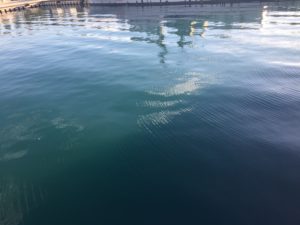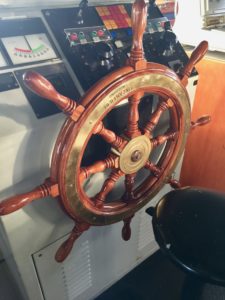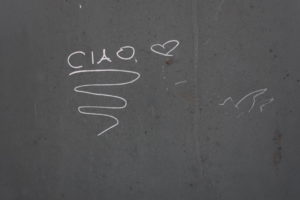 Aviere. Alpino. I stepped outside the skin of the ship on the port side and granted them a closer look.
Aviere. Alpino. I stepped outside the skin of the ship on the port side and granted them a closer look.
Standing in the evening air amongst the smokers, I felt a familiar tiredness following a day of physically undemanding but mentally punishing tasks. This was likely the result of four nonstop work weeks combined with the weight in humidity from the scirocco winds that had been blowing all day. My boots felt heavy, and as I walked on the main deck to the next meeting, my eyes scanned the waterline from west to east. From where we were moored, two other warships framed the panorama: Alpino. Aviere.
The ship to the west emphasized an agility that was communicated by sharp yet sparing angles. Everything about Alpino boasted modernism and an eagerness to move on a moment’s notice. The ship to the west—the one occupying the most sheltered area of the basin—was a near opposite. The nearly 34-year-old Aviere, initially built for the Iraqi Navy but repurposed following a 1980s political embargo, could not belie the effect that time had worn into her frame. The endless bumpy layers, products of outdated technology as well as wear and tear, had a maturity made only more pronounced by the layers of haze grey paint. Aviere—unlike Alpino—would no longer be a forerunner of security; instead she sat waiting for the day to be deactivated from service.
 Back on the ship where I was currently working, I had walked this length of space many times already. Nothing in the environment had changed- but still, in this moment following evening colors, something beyond my mental task list made me stop. Maybe it was the pink-lavender of the southern Italian sky, or maybe it was the way the light hit the water and bathed the ships at rest—but for some reason, I found myself resting in place. For the first time in my life, I understood that this was the end. My remaining months in the Navy will soon turn into weeks. Here, as I stood on board this foreign ship, I accepted that this will be the last time that I will be working in this particular capacity.
Back on the ship where I was currently working, I had walked this length of space many times already. Nothing in the environment had changed- but still, in this moment following evening colors, something beyond my mental task list made me stop. Maybe it was the pink-lavender of the southern Italian sky, or maybe it was the way the light hit the water and bathed the ships at rest—but for some reason, I found myself resting in place. For the first time in my life, I understood that this was the end. My remaining months in the Navy will soon turn into weeks. Here, as I stood on board this foreign ship, I accepted that this will be the last time that I will be working in this particular capacity.
I am leaving the naval service, and indeed, I will miss so many aspects of shipboard life. The clanging hatches and metal protrusions that create deep and throbbing bruises, the metal-fragranced air, the demanding precision required to execute complicated operations while making each one look easy. And of course, the ever-present welding, needle gunning, and other noise pollution that reminds a ship’s captain of the constant human care required to keep the entire production going, 24 hours a day. Crazy to imagine, but when it is all finally gone, I will miss this version of life.
 And as such, working aboard a ship does not allow for much time or reflection. There is always something that you are running to, something that requires repairing, or someone who is seeking your signature. Despite the compressed tempo, on this November evening I still found myself standing and suddenly overcome with emotion. I would not have expected it to happen in this port filled with a language I did not understand, with customs slightly different than those that I knew—but all the same, tears came to my eyes. If only for a brief moment.
And as such, working aboard a ship does not allow for much time or reflection. There is always something that you are running to, something that requires repairing, or someone who is seeking your signature. Despite the compressed tempo, on this November evening I still found myself standing and suddenly overcome with emotion. I would not have expected it to happen in this port filled with a language I did not understand, with customs slightly different than those that I knew—but all the same, tears came to my eyes. If only for a brief moment.
The trigger, of course, stemmed from the calculation I made while taking in those two warships that sat silently in home port. Alpino. Aviere. They meant nothing to me or my history, but all the same, I felt the universal pull of connection. Each ship, in broad terms, was one in the same—it was just that they occupied two distinct and significant points on the spectrum of service life. And from where I stood, Aviere, the one without the sexy angles, was moored much closer to my ship.
 This sunset reckoning probably took less than 60 seconds. Before I knew it, I was off again and refocused on my objective. The tears in my eyes had been dried by the scirocco in a matter of seconds. I walked on, opened the hatch to the helo hangar, raised one foot then the other over the knee-knocker, and then took a free chair next to my coworkers. I sat ready to take notes—or at least create the impression of being engrossed—until the required meeting time had elapsed and we’d all be released to the next pressing thing. For the moment, the ship was relatively quiet.
This sunset reckoning probably took less than 60 seconds. Before I knew it, I was off again and refocused on my objective. The tears in my eyes had been dried by the scirocco in a matter of seconds. I walked on, opened the hatch to the helo hangar, raised one foot then the other over the knee-knocker, and then took a free chair next to my coworkers. I sat ready to take notes—or at least create the impression of being engrossed—until the required meeting time had elapsed and we’d all be released to the next pressing thing. For the moment, the ship was relatively quiet.
 On this unremarkable day, sunset had passed into another nightly routine. The bulk of the ship’s internal labor had come to rest and most of the crew retired to their phones, cigarettes, or coffee. In the morning, it was all sure to start again—and with that, we’d commence another day that would produce a percentage of ultimate completion. A completion that might not be so far away, but still one too final to contemplate for more than just a moment. More true for Alpino. Less true for Aviere.
On this unremarkable day, sunset had passed into another nightly routine. The bulk of the ship’s internal labor had come to rest and most of the crew retired to their phones, cigarettes, or coffee. In the morning, it was all sure to start again—and with that, we’d commence another day that would produce a percentage of ultimate completion. A completion that might not be so far away, but still one too final to contemplate for more than just a moment. More true for Alpino. Less true for Aviere.